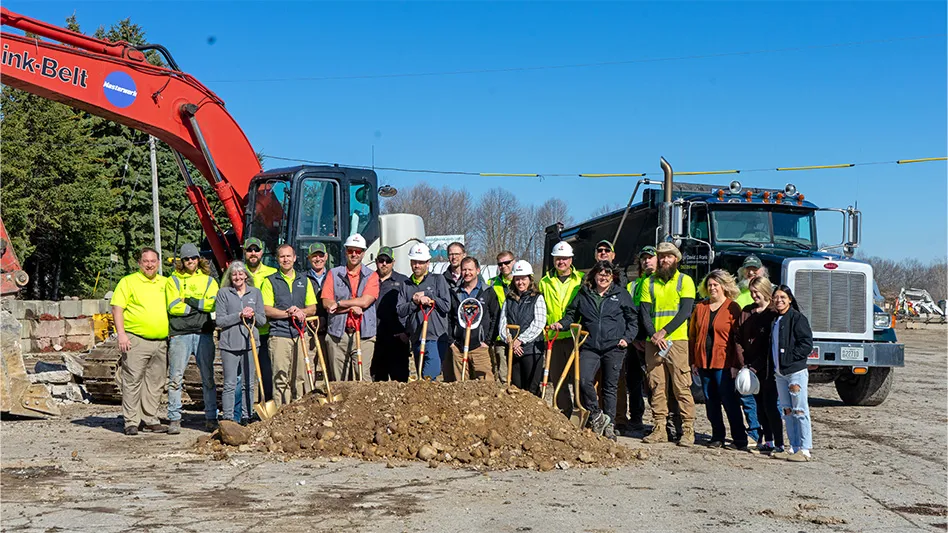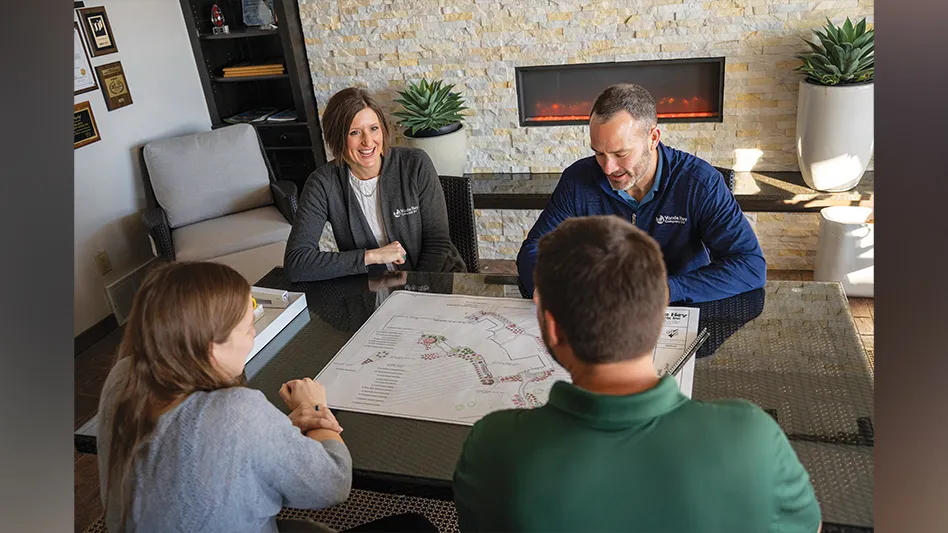

Building a lawn care business from a side hustle into a multi-million-dollar operation isn’t easy. For Steve and Shawn Bromell, the husband-and-wife team who own Pro Cutters Lawnscapes near Atlanta, growth required decades of persistence until they found their niche.
Steve first pursued lawn care as a side job with his roommate while working at FedEx. A few years later, he and his business partner went full-time, until Steve decided to venture out and start his own company. Shawn never imagined a career in lawn care while working as a television news anchor and reporter, but after marrying Steve in 2001, she decided to leave TV to help him grow his business.
Although they shared a strong work ethic and commitment to excellence, the couple struggled to strike the right pace for growth as they overextended their capital and ended up in debt.
“We thought we needed all this equipment, and the only way to get it was to get loans,” Shawn says. “It was a house of cards, and we eventually dissolved that business. Pro Cutters got the benefit of (those financial challenges) because after we got burned by debt, we knew we wanted to proceed debt-free, so we had to come up with creative ways to buy equipment without putting ourselves in a bad position.”
Now, 11 years since founding Pro Cutters in 2010, their commercial lawn maintenance company is on track to break the $20 million mark this year, thanks to their debt-free approach to growth through collaboration.
Entering a new niche.
When they launched Pro Cutters, the Bromells realized that the commercial lawn care market was oversaturated with small one-man-and-a-mower operations. Their competitors frequently underbid just to land jobs, as contracts often went to the lowest bidder. “We quickly discovered that we needed a niche,” says Shawn, Pro Cutters’ president. “We had to find something not everybody could do.”
Steve discovered their niche at a bid meeting for a large highway mowing project. When he learned that the work required specialized equipment and experience, he saw an opportunity to stand out. But since he couldn’t get roadside mowing contracts without roadside mowing experience, and he couldn’t get experience without equipment, he had to find other ways to build Pro Cutters’ infrastructure without going into debt.

He began pursuing projects that required large tractors, rotary cutters and other equipment used for roadside mowing. But he still needed to prepare his crews for dangerous roadside conditions. So, when a major storm hit Mississippi, Steve volunteered his crews to clean up debris along the highways there. Not only did it provide an opportunity to give back; it also provided the roadside experience his team needed. “That was a great opportunity for us to … at least get the safety component down,” says Steve, operations manager.
Finally, around 2012, another contractor reached out to request Pro Cutters’ support on a roadside mowing contract — giving Steve’s team the subcontracting experience they needed to break into the highway market. Today, this service accounts for about 75% of Pro Cutters’ business.
Scaling growth with subs.
The initial subcontracting agreement gave Pro Cutters 10 days to be on the jobsite with a certain number of tractors and workers. Although they’d spent years preparing for this opportunity, the rush to the finish line was exhausting. “Let’s just say I had a bottle of Tylenol nearby,” Steve jokes. As Pro Cutters began winning bids for larger projects, Steve knew he needed a more sustainable way to scale his infrastructure for each job.
That’s when he realized that the subcontractor model wasn’t just their entry into the market — it was the key to their ongoing success. Instead of buying new mowers and hiring more people for every contract, Pro Cutters began to “join forces” with other lawn care companies to supplement the equipment and experience they needed.
“We started to scale by bringing in other subcontractors,” he says. “(The benefits were) twofold: being able to disperse the financial burden and also being able to give other people an opportunity, because I knew how hard it was for us to get an opportunity.”
This approach positioned Pro Cutters to tackle even bigger jobs without leaving extra people or equipment sitting idle after contracts end, which helps optimize operations. Today, Pro Cutters supplements its workforce with about 15 subcontractors, pulling in other companies to support one-third of its projects. Some subs have partnered with Pro Cutters for several years; in fact, most of them are former employees.
Training entrepreneurs.
When it comes to other lawn care companies — or employees who dream of starting their own companies — Steve doesn’t see competitors.
“Everybody is an opportunity for a relationship,” he says. “They’re all doing the same thing I’m doing, and I can’t knock them down to get up.”
“Success for me is getting to the mountaintop and looking to the left and right (to see) someone there with me.” Steve Bromell, operations manager, Pro Cutters Lawnscapes
This collaborative mentality permeates the way Steve treats subs and staff alike. By building relationships around shared core values and looking for ways to help others advance, he sets a foundation for mutual growth.
He communicates these values using the acronym, S.T.E.W.A.R.D.S., which stands for: safety first, trust, excellence, wisdom, accountability, respect, diversity, discipline and serving. Pro Cutters’ onboarding process for employees and subs centers around these principles by explaining how the company conducts its business.
Steve expects managers to mentor new hires closely by modeling these values in action. With a dedication to “servant leadership,” Steve and his team take time to get to know the employees they mentor, frequently asking people what they need to be successful.
For example, a father and his two sons approached Steve after working for Pro Cutters for five years, explaining that they wanted to run their own business. Steve saw it not as a threat, but as an opportunity to prepare them for leadership. They worked closely with Steve for another three years before leaving to launch their own company. Steve even helped them buy some equipment to get started, and continues to mentor them as they grow their business.
“When you identify someone (with) aspirations to have their own business,” Steve says, “instead of fighting to keep them as an employee, find out how can you help them achieve their goals.”

Several former (and current) employees have launched their own lawn care businesses, and many partner with Pro Cutters as subcontractors after leaving the company. Steve has never asked anyone to sign a noncompete agreement, but he does remind them that there’s enough business to go around, and they can be more successful as collaborators than as competitors.
“If we fight over the same client, we run the risk of neither one of us having that client,” he often tells employees-turned-entrepreneurs. “I’m not coming after your customers, and you don’t need to come after mine. There’s enough grass for everybody to cut.”
Giving back.
Leveraging the lessons they’ve learned from growing Pro Cutters, Shawn and Steve seek opportunities to share their knowledge and success — not just with their own employees, but with other budding entrepreneurs in the community. The couple networks constantly by building relationships through their church and local chamber of commerce, while looking for opportunities to provide mentorship and financial support to other startups.
“We were not given the blessing of business just for us,” says Shawn, who serves on the board of the Boys & Girls Clubs of Metro Atlanta. “It was meant to be shared. It was meant to uplift the community, to employ people, to make our state better. We look at it as a responsibility.”
For example, the Bromells sponsor their local middle school — donating backpacks and other supplies and even buying Christmas gifts for students experiencing homelessness. Last year, they created a scholarship for “Students Who Mean Business” in Rockdale County, awarding $40,000 to five aspiring young entrepreneurs and surprising the other applicants with new laptops. Steve — who serves on the boards for the NALP Foundation, the Conyers-Rockdale Chamber of Commerce and Hills Academy, a private boys’ school in Conyers — also mentors local teens through a program called Men of Distinction.
As Pro Cutters continues to grow, the Bromells measure their success not just in numbers, but through new opportunities to reinvest in their community, expand their business network and mentor those around them to make an impact that transcends their business.
“Success for me is getting to the mountaintop and looking to the left and right (to see) someone there with me,” Steve says. “Success is … helping somebody else climb the same mountain.”

Explore the October 2021 Issue
Check out more from this issue and find you next story to read.
Latest from Lawn & Landscape
- Landscape Workshop acquires Cut Above Enterprises
- Scythe debuts new generation of M.52
- New identities
- Ruppert promotes Anderson to director of talent acquisition
- Fleet on the Street
- Man in the mirror
- EverSmith Brands appoints Ken Hutcheson as its new CEO
- Manitou unveils new Woodcracker tree saw with grapple





